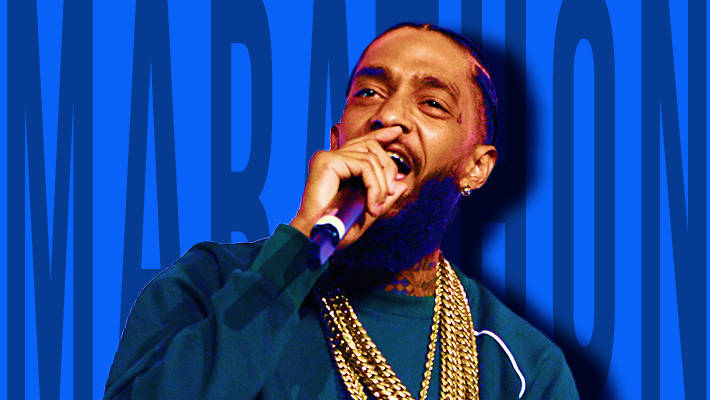It’s impossible to celebrate an extraordinary journey without talking about its beginning, no matter how humble it may be. For Los Angeles rap legend Nipsey Hussle, that was a decade ago, when he took the first step on his marathon mission with an album that mapped out the course he completed shortly before his passing in 2019. Over the years, the persona he’d curate of a streetwise, authentic, businessman/gangster/philosopher would become iconic, but the foundation of it was laid here, on The Marathon.
The Marathon is not really a groundbreaking album. I think that’s fair to say because, at the time of its release, there were dozens like it — and Nipsey always characterized it as a mixtape, technically speaking. 2011 was right around the beginning of the blog era boom that saw artists from all over the nation rise to prominence behind self-created mixtapes that played like albums — albeit, ones loaded with “borrowed” instrumentals from popular radio jams. Nipsey himself lifted the backing tracks from MGMT’s “Electric Feel,” Fabolous’ “You Be Killin Em,” Wiz Khalifa and Curren$y’s “Paper Planes,” Pretty Ricky’s “On The Hotline,” and Kanye West’s “Runaway,” sprinkling in the familiar hits among the original beats.
However, The Marathon also marked the departure from the purely mixtape-focused Nipsey into something else. The flow got crisper, yes, but the words got wiser. Nip leaned back a little from the talk of midday shootouts and under-the-table pharmaceutical sales that defined his Bullets Ain’t Got No Names series. The braggadocio began to come with gems scattered among the flexes. The original production grew more polished, betraying a desire for Billboard hits or, at the very least, national airplay. Consider the backing track for “Top Down“; Nipsey never sounded quite as commercial before, even on his one massive radio smash at the time, “Hussle In The House.”
But here, he displayed the lessons that he learned from his hit single. Where “Hussle In The House” paired Nipsey’s unusual, “cutting” flow with something familiar, the beat from Kris Kross’ 1992 debut single “Jump,” to make it more palatable to audiences who’d never set foot on the streets of South Central Los Angeles. It’s one thing to rap about Rimpau Blvd. alongside a guy named Rimpau but if the beat doesn’t capture folks’ attention immediately, they’ll never even listen long enough to remark on that irony. By tapping then-megahits like “Electric Feel” and “Runaway,” Nipsey put himself in a position for his street-smart philosophy to be heard.
This was also the first time we began to hear the roots of his capitalistic amibitions. While he’d flexed champagne and flatscreen televisions on Bullets Ain’t Got Names and Slauson Boy, The Marathon was the first time he tapped into the instinct at the heart of those flexes. “Rebel in this white man world until they bury him,” he snaps on “Keys 2 The City.” “Being broke is so un-American.” He was still a few steps away from the outrageous self-belief that led to the establishment of his “Proud To Pay” initiative and infamous $100 mixtape Crenshaw, but shades of it and his sage persona began to emerge here.
He also showed off his tech savvy, transitioning from hand-to-hand sales of his prior mixtapes to internet distribution. This was the real crossover for him; new technologies like streaming allowed for the tape to reach a broader audience and, unlike many of his peers and predecessors, he embraced them wholeheartedly. He saw the value in being an early adopter, in treading untamed territory and staking a claim before the lane got too crowded. He knew that the gratification for his big risks might well be delayed; that’s why he called the tape The Marathon.
Nipsey Hussle called his shot with this one mixtape, then made that mixtape groundbreaking and revolutionary with every action he took afterward. He made good on its promises, then paid homage to his own accomplishments with his debut album Victory Lap. Think about that; by the time his first “official” album dropped, Nipsey already considered himself a winner.
Ask anyone who runs or has run a marathon and they’ll tell you — it isn’t about time or speed or destination. It’s about lacing up your shoes at the starting line after months — perhaps years — of preparation, of proving to yourself that you can do this… and then, doing it. Taking that first step, then the next, then the next, until your lungs are burning, your legs feel like they’re going to fall off, and everything in you tells you to quit… but you don’t. You finish the race, just by running it. Ten years ago, Nipsey Hussle took on that responsibility. It’s safe to say, he earned his victory lap. Still, though, his legacy, the mission he set out on all those years ago, lives on. The marathon, as they say, continues.
Nipsey Hussle is a Warner Music artist. Uproxx is an independent subsidiary of Warner Music Group.




